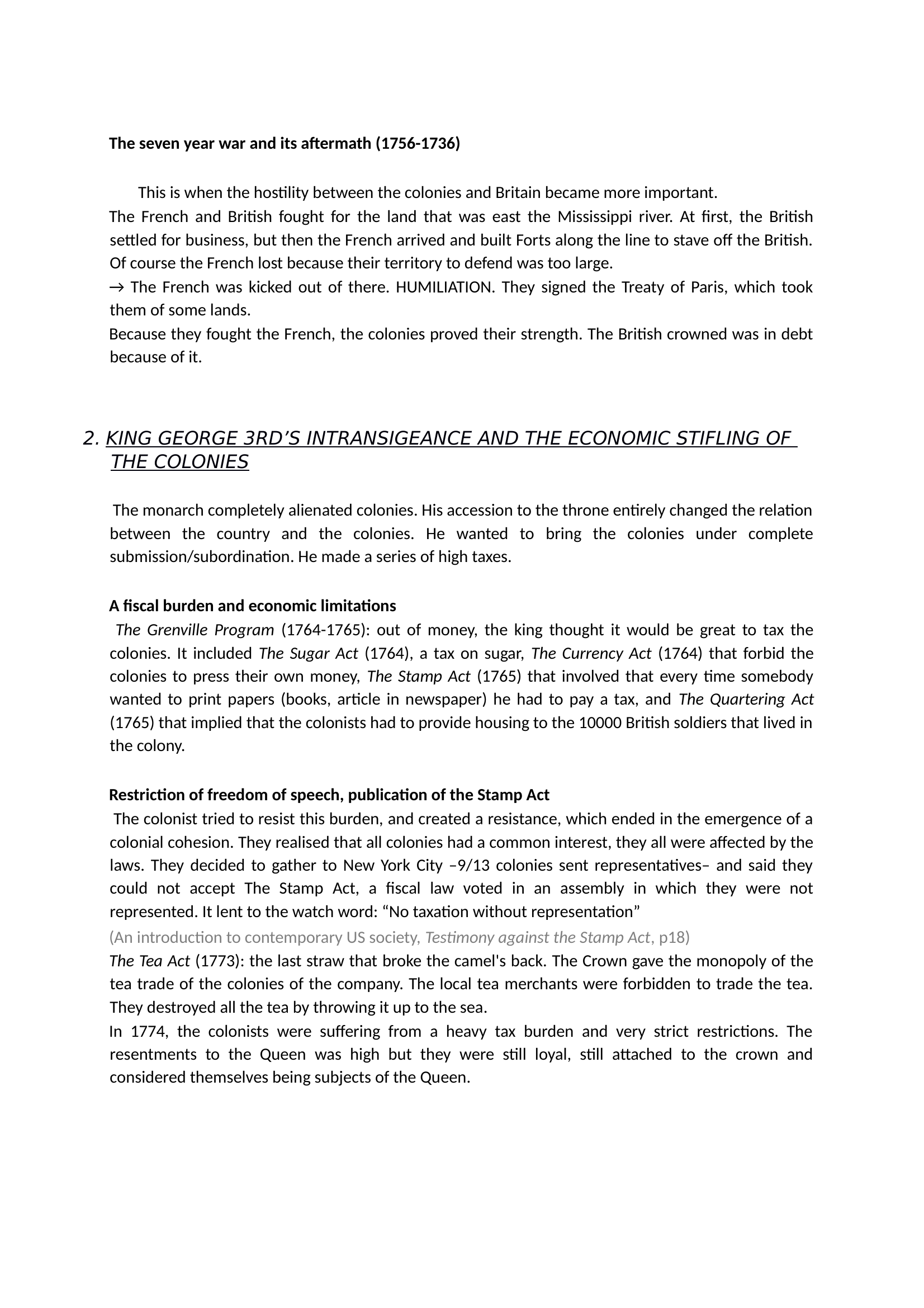Towards Independence - Protest and Unrest in the Colonies
Publié le 17/11/2015

Extrait du document
«
The seven year war and its aftermath (1756-1736)
This is when the hostility between the colonies and Britain became more important.
The French and British fought for the land that was east the Mississippi river.
At first, the British
settled for business, but then the French arrived and built Forts along the line to stave off the British.
Of course the French lost because their territory to defend was too large.
→ The French was kicked out of there.
HUMILIATION.
They signed the Treaty of Paris, which took
them of some lands.
Because they fought the French, the colonies proved their strength.
The British crowned was in debt
because of it.
2.
KING GEORGE 3RD’S INTRANSIGEANCE AND THE ECONOMIC STIFLING OF
THE COLONIES
The monarch completely alienated colonies.
His accession to the throne entirely changed the relation
between the country and the colonies.
He wanted to bring the colonies under complete
submission/subordination.
He made a series of high taxes.
A fiscal burden and economic limitations
The Grenville Program (1764-1765): out of money, the king thought it would be great to tax the
colonies.
It included The Sugar Act (1764), a tax on sugar, The Currency Act (1764) that forbid the
colonies to press their own money, The Stamp Act (1765) that involved that every time somebody
wanted to print papers (books, article in newspaper) he had to pay a tax, and The Quartering Act
(1765) that implied that the colonists had to provide housing to the 10000 British soldiers that lived in
the colony.
Restriction of freedom of speech, publication of the Stamp Act
The colonist tried to resist this burden, and created a resistance, which ended in the emergence of a
colonial cohesion.
They realised that all colonies had a common interest, they all were affected by the
laws.
They decided to gather to New York City –9/13 colonies sent representatives– and said they
could not accept The Stamp Act, a fiscal law voted in an assembly in which they were not
represented.
It lent to the watch word: “No taxation without representation”
(An introduction to contemporary US society, Testimony against the Stamp Act , p18)
The Tea Act (1773): the last straw that broke the camel's back.
The Crown gave the monopoly of the
tea trade of the colonies of the company.
The local tea merchants were forbidden to trade the tea.
They destroyed all the tea by throwing it up to the sea.
In 1774, the colonists were suffering from a heavy tax burden and very strict restrictions.
The
resentments to the Queen was high but they were still loyal, still attached to the crown and
considered themselves being subjects of the Queen..
»
↓↓↓ APERÇU DU DOCUMENT ↓↓↓
Liens utiles
- Magna Graecia (Great Greece) Greek The collective name given to Greek colonies founded by settlers in southern Italy and the island of Sicily.
- Thomas Jefferson I INTRODUCTION Thomas Jefferson (1743-1826), third president of the United States (1801-1809) and author of the Declaration of Independence.
- This republic made a unilateral declaration of independence in 1991 and was recognized by the EEC and the UN in 1992.
- The break up of Yugoslavia in 1991 and Macedonia's unilateral declaration of independence brought a fierce reaction from the Greeks.
- Ideology and Rationality in the History of the Life Sciences




